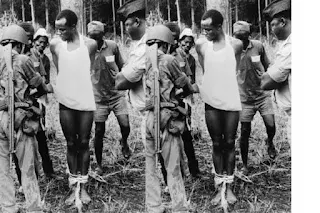Feb. 02, 1973 - Ugandan Executes Eleven Criminals .
- Get link
- X
- Other Apps
Feb. 02, 1973 - Ugandan Executes Eleven Criminals
Ugandan Executions Shock Africa: Twelve alleged criminals - eleven of them said to be ''guerrillas'' and the twelfth an armed robber - were executed in Uganda on Saturday (Feb 11). Nothing novel in that -except that the executions were in public, and the victims stripped naked before their deaths. Neighbouring African countries have been shocked by this ''new low'' even for the Amin regime. Photo shows Naked under his canvas apron, one of the alleged ''guerrillas'', Sebastiano Namirundu, contemplates his last few minutes of life before execution at Mbale
About the Archive
This is a digitized version of an article
from The Times’s print archive, before the start of online publication
in 1996. To preserve these articles as they originally appeared, The
Times does not alter, edit or update them.
Occasionally the digitization process
introduces transcription errors or other problems; we are continuing to
work to improve these archived versions.
Full articles
In Uganda last weekend, 12 men were
killed in exemplary public executions by firing squads. Some died
without blindfolds, watching their executioners load and take aim. Most
of them were in their 20's; the youngest was a schoolboy, 17 years old.
All were tried in secret by a military tribunal and convicted of
engaging in guerrilla activities.
The Government's evidence of guerrilla
activities in recent weeks has been circumstantial at best, and no
evidence against the 12 executed men was made public. The executions
were characterized by a military spokesman as “a real lesson to the
people of Uganda.” In other words, they apparently were intended as a
deterrent to potential dissidents against the harsh rule imposed in
recent months by the country's President, General Idi Amin.
There have been other signs of fear on
General Amin's part of action against him. The Government has been
warning that whole villages would be destroyed if their inhabitants were
suspected of helping or harboring guerrillas. General Amin said in a
speech to the armed forces, “If anything happens to me,, however, small,
get your gums.” He has scarcely been seen in public recently.
The security measures in Uganda have
strained relations with neighboring Kenya. The Kenyan press accused
General Amin's Government of harassing Kenyans in Uganda who are
officials of the country's joint railroad system. In answer, the General
threatened thousands of Kenyans of the Luo tribe in the country with
intimidation or expulsion. He later backed down, but not before some 200
frightened Luo families had fled.
Kenya's trade‐union organization thereupon threatened to block the
movement of goods from and to Uganda. If that threat were to be
implemented—and countenanced by the Kenyan Government—the consequences
to General Amin's regime would be disastrous. It would put a stop to
virtually the entire Ugandan export and import trade, since the
landlocked country depends primarily on Kenya for transit facilities.
At the week's end, it seemed likely that General Amin would seek to mollify the Kenyans and the dispute between the two countries would die down. But that depended to a large extent on whether the exodus of the Luo tribe stops.
The executions in Uganda were the latest of a series of surprising steps by General Amin that have made him the most unpredictable of Black Africa's rulers. Some months ago he carried out the mass expulsion of Uganda's Asian minority, mostly of Indian and Pakistani ethnic background. The Asians had carried out much of Uganda's commerce and filled many of the professional posts, and their abrupt departure—many, as British subjects, were permitted entry into Britain—left Uganda with a legacy of dislocation and bewilderment as to what would happen next.
- Get link
- X
- Other Apps














.png)
Comments
Post a Comment